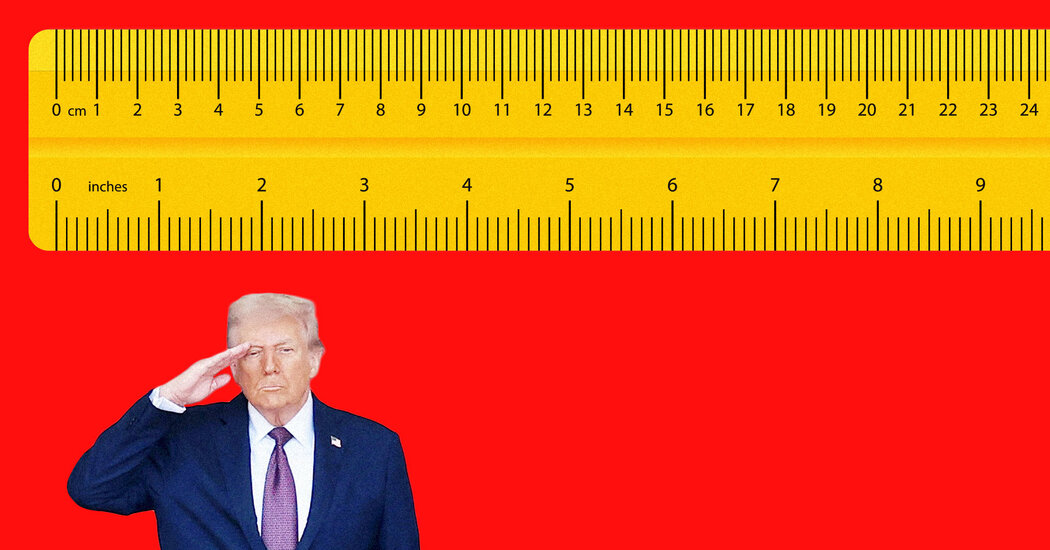It seems that Curtis Yarvin and I agree: The Trump administration is not making the most of its mandate, and it may be setting conservatism up for defeat in 2028.
Where Yarvin, the great proponent of absolute monarchy, and I differ is on where and why the administration is struggling. I think the Trump White House is leaning too hard into an unpopular form of postliberalism — deploying Caesarist power on behalf of the president’s longstanding obsessions (tariffs!) rather than the issues that actually elected him (inflation!), and turning too forcefully and obsessively against internal enemies while the concerns of swing voters are neglected.
Yarvin, predictably, thinks the administration is not being postliberal enough. In a recent Substack post, he argues that going after specific enemies is a poor substitute for, say, abolishing the entire judicial branch by fiat, and that the only thing lamer than what the Trump administration is doing already would be some sort of desperate pivot to “bread-and-butter governance.”
Since Yarvin’s thought assumes that the American project went astray in either 1688 or 1789, not in 1932 or 1964 or 2014, it’s fair to say that he will always be dissatisfied with the half-measures of presidents who don’t simply restore the Stuart monarchy.
But the present-day right is filled with nonroyalists who nonetheless find Yarvin’s zeal for the use of power bracing, and who suspect that appeals to swing voters and kitchen-table concerns are an excuse for selling out and letting the liberals win by degrees.
So I thought it might be worth offering a case for bread-and-butter governance as a necessary — though by no means sufficient — path to ideological transformation, by simplifying that case to an even simpler rule: A true revolution should be seeking a minimum of 12 years in power.
Twelve years here means three consecutive presidential terms, a number I’m choosing for two reasons. First, because it’s entirely attainable: Over the past century the same party has held the White House for at least three terms on three occasions (1921-33, 1933-53 and 1981-93) and come excruciatingly close on several others (the nail-biter elections of 1968, 2000 and 2016).
Second, because the most successful American ideological revolutions of the 20th century, Rooseveltian and Reaganite, were both three-term affairs, whereas in several cases a potential realignment or revolution was left unfinished or meaningfully rolled back because of a failure to claim just one more term.
This was true of Great Society liberalism, which for all its exertions fell short of establishing a consensus as durable as the New Deal or a welfare state as capacious as those of Western Europe — but which might have gone further if Lyndon Johnson could have passed the baton to Hubert Humphrey. It was true of the Obama presidency, which seemed poised to establish progressivism’s cultural dominance for a generation or more, only to yield to Trumpism because Hillary Clinton couldn’t hold the key Midwestern states. And further back it was true of Woodrow Wilson’s presidency, whose utopian progressivism yielded to an age of business-friendly libertarianism because he had no inheritor.
The difference between 12 and eight years may seem modest: Surely progressivism would have still faced populist rebellions if Clinton had won in 2016; surely the liberal coalition would have cracked up eventually even if Humphrey had eked out a victory in 1968.
But the extra four years of power have several meaningful effects. First, they all but guarantee a generational influence over the Supreme Court, enabling your ideas to endure powerfully even through future electoral defeats. (Even if populism had taken power in 2020, the culture wars of the 2020s might look very different with a liberal Supreme Court majority.)
Second, they change your opponents in fundamental ways — forcing them to accept that your revolution isn’t dependent on just a single charismatic individual, encouraging adaptations to your worldview that their base would otherwise resist. (See, for instance, Bill Clinton’s entire presidency.)
And third, they create a large cohort of younger voters and (crucially) younger elites who can barely remember the world before your initial victory, and who take your most important programs and reforms for granted, treating them as permanent features of the landscape rather than contested forays.
Of course, nothing is guaranteed in politics. You can have a long period in power in which very little is accomplished and the society you claim to be building slips further and further out of reach. (This is the story of the Conservative Party’s empty “dominance” in 2010s Britain.) You can have apparent successes that are completely undone by some great cataclysm. (This is the story of the Republican Party of the 1920s, which built a business-friendly libertarian consensus that was unmade by the Great Depression.)
But if a 12-year stint in power doesn’t guarantee lasting influence, a short duration is a really good way to make even the most ambitious and activist agenda evanesce. Yarvin likes to wax eloquent about the dictatorial style of Franklin Roosevelt, all the things he and his “brain trust” went out and just did when they were handed power in an emergency. (Including, yes, some uses and abuses of the Federal Communications Commission that make the Jimmy Kimmel affair look like peanuts.)
But the enduring influence of all that action depends on the fact that Roosevelt was extraordinarily popular at the outset of his experiments, and remained popular enough to win presidential election after presidential election, extending that power even through Harry Truman’s 1948 comeback. Whereas bold action that doesn’t yield subsequent political victories is destined to evanesce: Just ask all the Joe Biden boosters who spent the first year of his term comparing him favorably to L.B.J. and F.D.R.
Now, I suppose one could argue that F.D.R. was popular only because of his team’s institutional manipulations, or that he succeeded only because he persecuted his enemies and not because of bread-and-butter appeals. But this seems naïve and ahistoric. Even if the New Deal programs didn’t always work especially well or deliver renewed prosperity as fast as originally promised, Roosevelt was very good at convincing Americans that he cared about the same issues they cared about, that he was working with their desires and interests uppermost in mind. And that meant that even when his administration did go after its enemies, Americans still believed that their president was primarily in the depression-fighting business.
This is where the Trump administration is obviously falling short. It has acted aggressively, but it hasn’t persuaded the majority of Americans that those actions mostly serve the general good. It has consolidated presidential power, but it hasn’t consolidated the potential majority coalition that was within view in 2024.
Which means that all those bold actions will be vulnerable, and all those powers could pass to a liberal president in four short years, unless Trump or his would-be heirs can do the work that Yarvin disdains, and persuade more of the public that popular issues and anxieties are actually central to this populist presidency’s work.
Breviary
Scott Alexander considers “the Miracle of the Sun.”
Peter Thiel and Sam Wolfe ponder the Antichrist.
Noah Smith anticipates American stability.
Damon Linker contemplates the new religious right.
J. Robert Lennon appreciates Elmore Leonard.
Scott Sumner rides time’s arrow.
Ross Douthat has been an Opinion columnist for The Times since 2009. He is also the host of the Opinion podcast “Interesting Times.” He is the author, most recently, of “Believe: Why Everyone Should Be Religious.” @DouthatNYT • Facebook
The post An Ideological Revolution Needs 12 Years in Power appeared first on New York Times.




